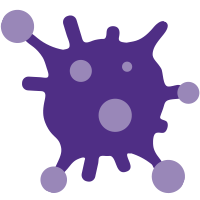
Immunology of Infectious Disease News
Immunology of Infectious Disease News is an online resource dedicated to covering the latest research and developments in the field of infectious diseases.
RIFINs Displayed on Malaria-Infected Erythrocytes Bind KIR2DL1 and KIR2DS1.
[Nature] Researchers demonstrated that activating killer immunoglobulin-like receptors can recruit natural killer cells to target a pathogen and revealed a potential role for activating immune receptors in controlling malaria infection.
ATF6 Enables Pathogen Infection in Ticks by Inducing Stomatin and Altering Cholesterol Dynamics
[Proceedings of the National Academy of Sciences of the United States of America] Investigators reported that Ixodes scapularis ticks infected with either Anaplasma phagocytophilum or Borrelia burgdorferi showed activation of the ATF6 branch of the unfolded protein response.
STING-ΔN, a Novel Splice Isoform of STING, Modulates Innate Immunity, and Autophagy in Response to DNA Virus Infection
[Cell Communication and Signaling] STING-∆N acts as a potent negative regulator of the cGAS-STING pathway, revealing a previously unrecognized regulatory mechanism by which alternative splicing modulates immune responses to DNA viruses.
Zika Virus Non-Structural Protein NS2A Mediated Endoplasmic Reticulum Stress through Interacting with Sarco/Endoplasmic Reticulum Ca2+-ATPase 2
[Journal of Virology] Scientists observed that Zika virus infection of astrocytes elevated Sarco/endoplasmic reticulum Ca2+-ATPase expression, increased intracellular Ca2+ concentration, and upregulated endoplasmic reticulum stress-related genes.
Nonstabilized SARS-CoV-2 Spike mRNA Vaccination Induces Broadly Neutralizing Antibodies in Nonhuman Primates
[Science Translational Medicine] Scientists compared immunization of macaques with mRNA vaccines expressing ancestral spike protein with or without diproline substitutions, showing that the diproline substitutions were not required for protection against SARS-CoV-2 challenge or induction of broadly neutralizing B cell lineages.
SARS-CoV-2 Nsp15 Enhances Viral Virulence by Subverting Host Antiviral Defenses.
[Proceedings of the National Academy of Sciences of the United States of America] Investigators provided evidence that the SARS-CoV-2 nonstructural protein 15 (nsp15) enhances viral virulence by suppressing the production of viral double-stranded RNA, a potent inducer of antiviral signaling.
SARS-CoV-2 Nucleocapsid Protein Directly Prevents cGAS-DNA Recognition through Competitive Binding
[Proceedings of the National Academy of Sciences of the United States of America] Scientists demonstrated that the SARS-CoV-2 nucleocapsid protein directly suppresses DNA sensing by cyclic guanosine monophosphate–adenosine monophosphate synthase.
Infant Antibodies After Maternal COVID-19 Vaccination During Pregnancy or Postpartum
[Pediatrics] A maternal COVID-19 booster in pregnancy resulted in significantly higher functional antibody titers in infants compared with 2 doses in pregnancy or postpartum.
Evolutionary Dynamics of Heparan Sulfate Utilization by SARS-CoV-2
[mBio] Researchers revealed a significantly higher affinity between the Omicron spike and cell surface heparan sulfate compared to the wild-type spike.
Molecular/Antigenic Mimicry and Immunological Cross-Reactivity Explains SARS-CoV-2-Induced Autoimmunity
[Autoimmunity reviews] The authors provide a meticulous review of the studies reporting those mimicking sequences that have been experimentally validated, based on the assumption that molecular mimicry and immunological crossreactivity may account for autoantibody development.
Trump Administration Ends Program Critical to Search for an H.I.V. Vaccine
The Trump administration has dealt a sharp blow to work on H.I.V. vaccines, terminating a $258 million program whose work was instrumental to the...
Anti-Sporozoite Monoclonal Antibody for Malaria Prevention: Secondary Efficacy Outcome of a Phase II Randomized Trial
[Nature Medicine] Investigators reported the prespecified secondary efficacy endpoint that used a Plasmodium 18S rRNA quantitative reverse transcription–PCR assay that is ~2,000-fold more sensitive than thick blood smear.
Immunology of Infectious Disease News was founded to keep the scientific community current with the latest developments in infectious disease research. We feature high-impact publications, news, jobs, and events focused on immune responses to and the development of treatments for infectious diseases such as COVID-19, HIV, hepatitis, tuberculosis, influenza, and malaria.

 Cancer Stem Cell News
Cancer Stem Cell News Cell Therapy News
Cell Therapy News Dermal Cell News
Dermal Cell News Endothelial Cell News
Endothelial Cell News ESC & iPSC News
ESC & iPSC News Extracellular Matrix News
Extracellular Matrix News Hematopoiesis News
Hematopoiesis News Hepatic Cell News
Hepatic Cell News Human Immunology News
Human Immunology News Immune Regulation News
Immune Regulation News
 Intestinal Cell News
Intestinal Cell News Mammary Cell News
Mammary Cell News Mesenchymal Cell News
Mesenchymal Cell News Muscle Cell News
Muscle Cell News Neural Cell News
Neural Cell News Organoid News
Organoid News Pancreatic Cell News
Pancreatic Cell News Prostate Cell News
Prostate Cell News Pulmonary Cell News
Pulmonary Cell News
